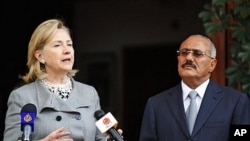Secretary of State Hillary Clinton, in an unusual high-level U.S. visit to Yemen Tuesday, said the two countries have a mutual interest in defeating the Yemeni affiliate of al-Qaida. The Clinton visit was not announced in advance because of security considerations. The secretary of state also met with Yemen's president, Ali Abdullah Saleh.
Clinton, who arrived in Yemen from Dubai amid heavy security, is the highest-ranking U.S. official to visit the country since former Vice President Dick Cheney visited in 2002, and the first secretary of state to do so since 1990.
The Clinton visit underscores American concern about the security situation in Yemen, where the local al-Qaida affiliate has attempted terrorist attacks against the United States, and only days ago killed more than a dozen Yemeni troops in an ambush.
Addressing a “town hall” meeting of Yemeni students, civil society activists and politicians, Clinton said terrorists operating from Yemen - many of whom are not Yemeni and include some Americans - are an urgent concern for the United States.
But she also said they are a threat to Yemen and its hopes to achieve political stability and a more prosperous future for a country now considered the Arab world’s poorest.
“While many in this room work tirelessly to create economic opportunities, al-Qaida and other violent extremists scare away foreign investors and tourists and make it more difficult for Yemenis to work, study and travel abroad. We have seen in Iraq how al-Qaida seeks to tear apart diverse societies. So I believe that your government’s efforts to disrupt al-Qaida’s operational planning, and to deny it safe-haven here in Yemen are profoundly in Yemen’s own interest.
Clinton stressed on arrival in Sanaa that the Obama administration has “rebalanced” the U.S. aid program to Yemen so that it is no longer “disproportionately” tilted toward anti-terrorism and security aid.
She said economic aid, making up nearly half of the $300 million U.S. assistance program this year, is aimed among other things at helping Yemen deal with dwindling oil resources and an acute water shortage.
She also stressed U.S. interest in the ongoing political reform debate in Yemen’s parliament. She said the United States would like to see changes that would create an inclusive political process in a country plagued by decades of civil war and instability.
Clinton said she would raise with Mr. Saleh U.S. concerns about a proposed constitutional change that would end presidential term limits and allow him remain in office beyond his current mandate, ending in 2013.
The 68-year-old Yemeni president, a U.S. ally, became leader of the former North Yemen in 1978 and has ruled the united Republic of Yemen since the north and south merged in 1990.
A senior U.S. official acknowledged earlier this week that persuading the long-time Yemeni leader to yield power is what the official termed “a hard sell.”
Clinton met at the heavily-fortified U.S. embassy in Sanaa, the site of a lethal terrorist attack in 2008, with members of the Yemeni political opposition.
U.S. officials said in both the meetings with President Saleh and the opposition, Clinton stressed the need for an inclusive, credible Yemeni electoral process.
Clinton Backs Yemeni Efforts Against al-Qaida




